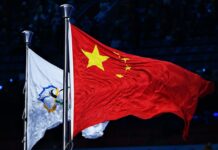(TibetanReview.net, Jun13’21) – Although there may not be a boycott of the sports, the prestige of the Beijing Winter Olympics of 2022 already stands severely dented by the ongoing campaigns, especially by the now ongoing call for its diplomatic boycott. It has compelled Beijing to defend its deplorable human rights record in Xinjiang and Tibet as well as in China itself.
On May 18, US House Speaker Nancy Pelosi, addressing a bipartisan congressional hearing on the issue, urged lawmakers to push not only for the US to shun the event but also for “lead countries” around the world to “withhold their attendance at the Olympics”.
“Let’s not honour the Chinese government by having heads of state go to China,” she said.
On Jun 7, a group of politicians across Europe and North America launched coordinated legislative actions, calling for a diplomatic boycott of the 2022 Beijing Winter Olympics.
Spanning 11 countries and parliaments, the actions aim to pressure governments, elected officials and heads of state to decline invitations to next year’s Games, citing “gross violations of human rights” by the Chinese government, reported the scmp.com Jun 7.
The action was aimed to mount pressure on governments, elected officials, and heads of state, to decline invitations to next year’s Olympics.
The campaign followed rights groups’ calls for a full boycott over human rights infringements in Xinjiang, Tibet and Hong Kong, charges expectedly denied by Beijing.
On Jun 10, the Senate of the Czech Republic adopted a resolution, urging the country’s political leaders to boycott the event over Beijing’s human rights abuses.
Pointing to “massive” violations of human rights and freedoms in China, particularly against Tibetans and Uyghurs, the resolution called on Prague to “systematically” raise the human rights situation in China in multilateral fora such as the UN Human Rights Council.
Diplomatic boycott of Olympics is not without a precedent. In 2008, the then-Czech Prime Minister Mirek Topolánek declined to attend the opening ceremony of the Summer Games in Beijing to denounce China’s violent repression of the wave of peaceful protest in Tibet in March of that year, although he attended the rest of the Games.






